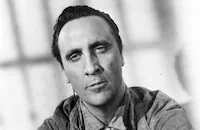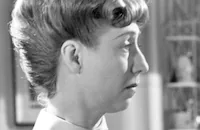The Second Time Around

Brief Synopsis
Cast & Crew
Vincent Sherman
Debbie Reynolds
Steve Forrest
Andy Griffith
Juliet Prowse
Thelma Ritter
Film Details
Technical Specs

Synopsis
In 1911, recently widowed Lucretia Rogers leaves her two small children in New York with her frosty mother-in-law and travels to Charleyville, Arizona Territory, where she has been offered a storekeeper job by a friend of her late husband. Upon arrival, however, she learns that her benefactor has been killed in a holdup, and she takes a farmhand job on a ranch owned by Aggie Gates. Lu's outspoken nature and good looks win her the admiration of both Dan Jones, the handsome owner of the local saloon, and Pat Collins, a mother-dominated rancher. Aggie tries to marry off Lu to Pat, but Pat's mother discourages the match. When Lu proves that the dishonest sheriff, John Yoss, is in league with gunmen, the women and the law-abiding citizens of Charleyville elect her as the new sheriff. Yoss retaliates by attacking and looting the town and kidnaping Lu; but Dan, Pat, and the townspeople form a posse, raid the gunmen's hideout, and rescue Lu. The reward money enables Lu to bring her two children to the new state of Arizona. As she throws her arms around Dan, Lu tosses her sheriff's badge to Pat.

Director

Vincent Sherman
Cast

Debbie Reynolds

Steve Forrest

Andy Griffith
Juliet Prowse

Thelma Ritter
Ken Scott

Isobel Elsom
Rudolph Acosta

Timothy Carey
Tom Greenway
Eleanor Audley

Blossom Rock
Tracy Stratford
Jimmy Garrett
Lisa Pons

Nicky Blair
Jack Orrison
Crew
Jack R. Berne
Alfred Bruzlin
Ellis W. Carter
Jack Cummings
Don Feld
Gerald Fried
Cecil Dan Hansen
Henry Mancini
Frank W. Moran
Ben Nye
Stuart A. Reiss
Oscar Saul
Walter M. Scott
Walter M. Simonds
Jack Martin Smith
Betty Steinberg
Helen Turpin

Film Details
Technical Specs

Articles
The Second Time Around
Steve Forrest co-stars as Dan Jones, the devilishly charming proprietor of the Lucky Devil who takes an instant interest in Lu, and Andy Griffith is the gallant Pat Collins, a rural farmer with a plainspoken decency behind his trademark drawl and rural homespun manner. It's another man entirely, however, who changes the course of her life: the crooked, bullying sheriff of Charleyville, who so rouses Lu's ire that she challenges him in the town's first election after Arizona is admitted as the 48th state in the nation.
The Second Time Around draws from some of the more lighthearted western conventions: the tenderfoot on the frontier, the spunky, single female settler, and the knockabout comedy of the boisterous, brawling western that John Wayne popularized with North to Alaska (1960) and turned into a specialty with McLintock! (1963). Debbie Reynolds requested director Vincent Sherman for the picture and he accepted the assignment to work with the actress, but on condition he could rework the script. "We inserted as much action and humor as possible into the script," wrote Sherman in his autobiography. "As for Debbie, I can only say that never have I worked for a brighter, more cooperative, or more knowledgeable actress." She was quite the trooper and Sherman was impressed that she insisted on doing many of her own stunts. Reynolds gets her share of pratfalls and mud baths and the film tosses in free-for-all brawls in the expected saloons as well as an unexpected location: a classy, Eastern-style ice-cream parlor on the town's dusty Main Street. Reynolds, of course, dives right in to the action.
Thelma Ritter had a reputation as a wily scene stealer which Reynolds confirmed during the shooting. In one scene, while Reynolds delivered dialogue, Ritter was in the background repairing a shoe with a hammer and mouthful of nails. "I could hear her literally spitting nails," recalled Reynolds in her memoir, completely upstaging her, even after Ritter agreed to stop hammering through the scene. "She was a master."
Homespun manner aside, Andy Griffith proved to be an inexperienced horseman, bouncing painfully in the saddle as he rode up to Ritter's ranch and falling right off of his horse when it came to a halt. "Thelma and I had to bite our tongues to keep from laughing," wrote Reynolds. As a good-natured joke, she presented him a stuffed full-sized palomino at the wrap party with a card that read: "A little something you can practice on." Griffith loved it so much that he strapped it to the top of his station wagon and drove it home.
Sources:
Unsinkable: A Memoir, Debbie Reynolds and Dorian Hannaway. William Morrow, 2013.
Studio Affairs: My Life as a Film Director, Vincent Sherman. The University Press of Kentucky, 1996.
By Sean Axmaker

The Second Time Around
Quotes
Trivia
Notes
Prerelease titles: Star in the West, The Calico Sheriff, and Mother Ought To Marry.

Miscellaneous Notes
Released in United States Winter December 1961
CinemaScope
Released in United States Winter December 1961













